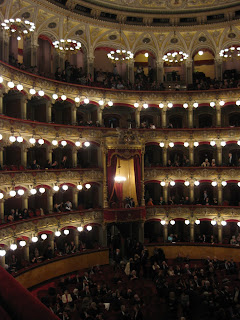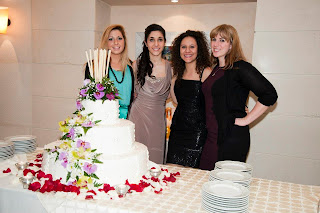Before
I set out on this journey, I gave a lot of thought to why exactly I wanted to
do a program based on teaching English. My reasons for wanting to travel to
Italy are quite simple: the country is obviously gorgeous, the food delicious,
and I studied Italian language in college. Having the opportunity to live there
for an extended period of time is the best way to immerse myself within the
language and lifestyle. I could have done this simply by back-packing through
Italy though, or participating in an actual study abroad program in which I
would spend at least three days a week in a classroom studying the language.
The question I asked myself was why did I feel a teaching program was the best
route? What could I bring to the program as someone teaching English, and how
would I benefit from it?
I
had the strange advantage of tutoring Italian language to English speaking
students at Seattle University, and while I was teaching beginners’ grammar in
Italian, I discovered that I had to teach the students more basic English
grammar than Italian in order for them to understand the latter. As frustrating
as this was in terms of time-management (covering twice as much material in
short periods of time) it was easy to explain an English concept to an English
speaker. It was also very easy to explain the Italian concepts in English to
the students. In choosing a program to apply to, I looked specifically for
programs that emphasized teaching English grammar because I wanted to see the
flip-side of what I experienced in college; I wanted to see what it was like to
teach my first language to someone who has little to no knowledge of it. How
would I explain these concepts that to my other English speaking students were
second nature? When given the choice, I have a tendency to choose a more
challenging task than an easier one to see just how well I can accomplish it. I
have never been a competitive person when it came to sports or games. Competing
with others does not interest me as much as competing with myself; what can the
“Present or Future Alyssa” achieve that “Past Alyssa” could not?
Outside
of my own personal goals that I had set for myself, I also saw a teaching
program as a great opportunity to build my resume. I have been working since I
was 15, earning my own money, paying for much of my own travels through high
school and college, but with the state of the job market now, my various
waitressing jobs and internships seem to mean nothing. Of course I know that I
am a hard-worker and all of my “meager” job experience will one day come in
handy, but as I look towards my future, one that I hope might include me
becoming a teacher, I wanted to do more to steer my path in that direction. I
wanted a taste of what teaching, in probably the most frustrating circumstance,
would be like.
There
are so many quirks in the English language that, for those of us who speak it,
seem so trivial that we never stop to think about them. How does one explain
these strange quirks, these exceptions to every damn grammar rule, these
moments in the English language where the words we speak seems an insult to what
logic says we should say? Allow me to provide you with some examples of these
moments that I have had to try and explain to my host sister. As you read over
these, think of how you would explain these concepts to someone:
1)
The infamous O-U-G-H spelling. The spelling looks simple enough, but now think
of how this spelling is pronounced in the English language
-through—pronounced
“thru”
-though—pronounced
“tho”
-rough—pronounced
“ruff”
-cough—pronounced
“coff”
2)
Take a look at the following sentences:
-The dove
sitting on the tree branch dove for the worm.
-The brown bear
could not bear the weight of carrying her cub
anymore.
-You should address
the envelope with the address on the label.
-He wound
up wrapping his wound with gauze.
All
of these words have the same spelling, but one word is a verb and the other a
noun.
3)
There are also many words that sound the same, but are spelled differently and
have different meanings:
-Wait
and Weight
-Right
and Write and Rite
-Heard
and Herd
Now
that you have thought about how you would try to explain these to someone in English,
try to think of how you might explain these concepts without the luxury of
speaking the same language, or at least be at the same level of a shared
language. These are only a few examples of things I have tried to explain to
Ida. I won’t begin to tell you how hard it was to explain the rules of “-ing”
and how the phrase “working-class” is not a verb. I’m pretty sure she has
wanted to throw our English books out the window many times. I know there have
been times that I have wanted to do just that.
Needless
to say, this experience has been a true test of my patience. I suppose that is
where I am having a competition with myself—how many ways can I try to convey a
concept before I go crazy? The ability to explain one concept in a number of
ways has been one of the unexpected benefits of doing this program. From
writing out puzzles to drawing pictures to even acting out certain words (or
complete scenes of Shakespeare), I can honestly say I have done it all. I
remember once during my senior year at Seattle U, as I was introducing myself
as the Italian Language tutor to the first year students, my Italian professor
told his class, “Alyssa ha la pazienza
della santa”—Alyssa has the patience of a saint. I laughed at this,
figuring he was trying to convince his students of my tutoring abilities. The
more I have tutored people however, I have come to understand what exactly my
professor meant by this. One does not simply need to have patience in teaching
the material, but also in listening to the needs of the student usually without
being told. Tutoring is really about observing the student, how they study, how
they learn best, how they react to stress or frustration, and trying to help them
navigate these difficulties with ease. During a study session, if I can see Ida
becoming frustrated over something trivial, the best thing for me to do is to
have her talk and simply vent her frustrations. Usually these frustrations are
unrelated to the concept at hand and for her to have someone there (other than
her mother) to listen to her and give her advice is helpful.
What
I have learned is that few of her teachers have any patience at all, especially
her English teacher. I cannot stress enough the importance of teacher
encouragement. It pains me to see how hard Ida works on studying English, how
she goes above and beyond what is required for her, even getting an American
girl to come live with her, for it to be met by sarcasm and disinterest from
her teacher. I have met this teacher of hers and she is a real piece of work,
folks. She obviously has a power complex—“I am the teacher and therefore I am
always right.” I cannot begin to describe how badly I wanted to correct her
terrible English while I was in her class. Here she was continually telling the
students how horrible they were doing in the class, how they were not getting
anything right, and yet she believes it is pronounced “becod” rather than “because.”
This is not due to her accent either, folks.
That
day in her class, the teacher dumped her lesson off on me which made my stomach
drop. I literally walked into her class, completely unassuming, and within five
minutes was handed the class textbook and told to teach about the Age of Reason
to a class of 25 Italian students. That was by far the fastest recalling of
freshman philosophy that I have ever done, and I gave what I thought was a
terrible outline of that time in history. I had left out what I thought were
important details because I couldn’t keep them all straight. After that, the
teacher told me to continue teaching Wuthering
Heights to the class. Luckily, as I have a BA in English Literature, this
was a novel I knew very well, and I felt confident in reading a chapter to the
class and explaining the time period that the novel is set in. While the
experience of teaching an entire class was strangely intimidating at first,
there were moments when I felt comfortable being in front of a room full of
students, talking about something I was passionate about. It was easy to see
that no one else in the class shared that same enthusiasm, but it was a
revelation on my part that they assisted in. I left the class feeling
unsatisfied in how I went about teaching that day. I began critiquing my every
choice and kept thinking that if only I had known that that was going to
happen, I could have prepared something so much better. When I mentioned this
to Ida on our walk home, she told me that I actually gave the best lesson for
that class they had had all year. Apparently, her teacher does not have the
patience or desire to explain anything about history at all, and for the first
time, the class actually understood what they were reading and how it all
connected. All of this simply because I explained how the introduction of the
printing press led to more people being able to read.
So
I have been able to see and experience teaching English from many different
angles on this journey. At the beginning, I wasn’t sure how I could contribute
to the program or how helpful I would be to Ida. As I near the end of my
adventure here, Ida is now speaking English in complete sentences, correcting
herself if she makes mistakes, and can watch an entire movie in English and
garner an understanding from it. Granted, this all takes a lot of effort on her
part, but she is still doing it. I have also become a sort of spokesperson for
the program as well, contributing as a “Travel Writer” to the Greenheart Travel
Blog and corresponding with various students applying to the program. Even
through the moments of frustration and wanting to pull my hair out over some
explanation, I am happy with everything that I have learned here about teaching
and about myself as a teacher. I suppose I am even satisfied with what I have
taught here. Perhaps there is a future in teaching for me after all.



















